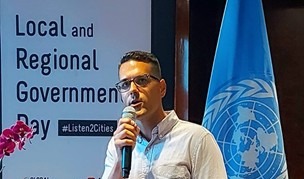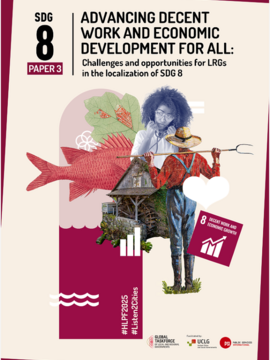Decent Work and Economic Growth PSI-UCLG Report Shows How Local Governments and Unions Can Advance SDG8 Through Constructive Dialogue

The PSI/UCLG paper on SDG8 highlights the critical role of local and regional governments (LRGs) in promoting sustainable economic growth and creating decent work within their territories. It affirms their responsibilities as public service employers and emphasises their capacity to influence local economies through social value procurement practices. Ultimately, the paper demonstrates that the effective realization of SDG8 is best achieved when LRGs engage in social dialogue and collective bargaining with trade unions.

Daria Cibrario
On 16 July 2025 PSI and UCLG launched their joint paper “Challenges and opportunities for LRGs in the localization of SDG 8” on the localisation of SDG8 ‘Decent Work and Economic Growth’. at the UN’s High Level Policy Forum 2025 at the UN headquarters in New York (USA).
The PSI-UCLG paper on SDG8 underscores the essential role of LRGs in driving sustainable growth and decent work creation in their territories; asserts their role and responsibilities as employers of local public service staff and their agency through social value procurement practices; and ultimately shows how SDG8 can be best fulfilled when LRGs enter into social dialogue and collective bargaining with trade unions.

To fully achieve SDG8, we need local leadership and commitment to local workers as a beacon of development
Ethan Young, PSI Sub-Regional Secretary for North America represented PSI at the UN HLPF Launch event on 16 July. He said: “Our current system excludes those closest to the frontlines: Local governments, trade unions, and communities. To fully achieve SDG 8, we need local leadership and commitment to local workers as a beacon of development”.
Daria Cibrario, PSI Senior Policy Officer coordinated the PSI union survey and co-authored the paper. She said: “This joint PSI-UCLG paper recognises the vital role of local and regional governments (LRGs) in advancing SDG8—not only as public policy leaders in their territories, but also as employers with clear responsibilities towards their own staff in LRG workplaces. It underscores the importance for LRGs to uphold freedom of association and engage in good-faith collective bargaining with representative trade unions. The paper offers concrete examples of good practices of how this benefits everyone, including local communities who gain access to quality public services. The paper also highlights the advantages of direct public service provision and employment relationships, socially responsible procurement, local tripartite cooperation, and calls for a renewed focus on territorial employment pacts as a key strategy to boost inclusive local economic development”.
Highlights from the paper
The paper contains some key messages accompanied by examples PSI affiliates can refer to when negotiating with their LRG employers and asserting their key role as both social partners and actors in social development. These include the following:
LRGs can play a critical, progressive and transformative role by fostering an enabling environment for the implementation of SDG8 in both the territories and workplaces that fall under their jurisdictions.
By upholding the labour rights of LRG service workers and ensuring decent working conditions (including by negotiating with their employees’ unions), LRGs can directly realize SDG8 in their workplaces.
The eight fundamental ILO conventions cover: freedom of association; the effective recognition of the right to collective bargaining; the elimination of all forms of forced or compulsory labour; the effective abolition of child labour; and the elimination of discrimination in respect of employment and occupation. With respect to these, if a country is an ILO member, these conventions apply throughout the territory regardless of whether the country’s central government has ratified them.
Because labour rights are human rights, LRGs can position themselves as legal guardians of decent work and labour rights in the territories and workplaces they oversee, thus making a major, concrete contribution to localising SDG8. LRGs also step up when national regulations and protections for workers fall short and implementation systems default.
Quality public services in public hands — with adequate numbers of skilled staff in decent working conditions, with labour rights and occupational safety and health — are a key equalising factor for communities.
Women make up the majority of LRG staff, and they currently remain relegated to low-paid, feminised and horizontally-segregated professions, such as primary education, care, social services, health services, tourism and janitorial services. If SDG8 is to be implemented, this must change
Local tripartite cooperation among LRGs, their workers’ unions and national institutions in promoting active labour market policies and creating decent jobs in territories, while improving access to quality public service provision is a winning strategy to implement SDG8.
As employers, LRGs are pivotal for upskilling their LRG workforce and dignifying unskilled work. They can best do so by entering into constructive social dialogue and collective bargaining with their workers’ unions.
LRGs can promote fair labour practices in their territories through social value procurement, which means evaluating not only the price-to-quality ratios in the public procurement of goods or services but also taking into consideration their broader social, economic and environmental impacts, including decent job creation, including the facilitation of professional transitions, vocational training, re-skilling and the return to the labour market for the mid- and long term unemployed.
The direct provision of public services through the establishment of new, needed public services (“municipalisation”); the return of previously privatised ed public services under LRG control, management and ownership (“remunicipalization”); and the “in-sourcing” of jobs that may be informal and precarious (hence not decent) under direct, LRG employment with decent working conditions are excellent ways to ensure decent work in local communities and workplaces, all while providing equitable access to local public service provision. These options offer significant benefits in terms of service quality, expanded and more affordable access, long-term cost-effectiveness, public accountability and decent work creation.
Good practices drawn from PSI union experiences
The paper refers to a number of good practices drawing from public service union experiences, initiatives and wins whose primary resources are provided in the paper for consultation. These include the following:
UNISON’s Ethical Care Councils Charter, which entails a commitment by contracting councils to ban zero-hour contracts and ensure the recruitment and retention of a more stable workforce through more sustainable pay, conditions and training levels in care services.
The 2020 Canadian Union of Public Employees (CUPE) nationwide campaign “Fix long-term care” aimed to take profit out of long-term care for the elderly and ended in the decision of the government of Saskatchewan to invest 80 million CAD in long-term care, through the municipalisation of two facilities through substantial public investment; 82 renewal projects; and 13 new public elder-care homes in rural and remote areas of the province.
The Menn i Helse (“Men in Health”) program started in 2010 by the city of Trondheim (Norway) and subsequently become a national project. It functioned with support from and in cooperation with the Norwegian Local and Regional Government Association, the Norwegian Directorate for Health, LRGs and the Norwegian Union of Municipal Workers (Fagforbundet).
The remunicipalisation of waste management in Oslo (Norway) and of hospitals in several Australian localities; the 2023 introduction by the Autonomous Canberra Territory (Australia) of an Insourcing Framework as part of the government’s commitment to promote the well-being of the community by providing more secure employment for workers, a direct result of the Australian public service unions mobilisation; the introduction in March 2025 by the government of the Australian state of New South Wales of legislation to ban public-private partnerships for the management of acute hospitals, including by future governments, also a result of the mobilisation of Australian public service unions.
The 2021 memorandum of understanding signed by the city of Milan (Italy) to safeguard work quality in municipal procurement contracts negotiated with major Italian trade unions (CGIL, CISL and UIL). This agreement prioritises quality over lowest-cost tenders; ensures job continuity and stability (minimum four-year contracts); protects workers' rights during contract transitions; places limits on subcontracting; mandates the application of collective agreements to all workers involved in the procurement contracts; and establishes a public registry of companies that exercise unfair labour practices.
The cooperation between the Swedish Union for Professionals (Akademikerförbundet SSR) and the Botkyrka (Sweden) municipality to address the issue of social workers resigning due to challenging labour conditions in the profession. As a result of social dialogue, the municipality increased the wages of social workers and case managers by 2,000 SEK per month, covering about 260 workers.
The initiative by municipality of Yerevan (Armenia) to provide a health insurance package for its workers through municipal procurement with insurance companies.
In Buenos Aires (Argentina), both the municipal and provincial governments have implemented initiatives to foster dialogue with unions, businesses and civil society organisations to develop policies that promote decent employment. The municipal Economic and Social Council serves as an institutional space where government representatives and social partners collaborate to design public policies aimed at economic and social development, including job creation.
In Bislig (the Philippines), the local government and the Bislig City Employees Association have established a Collective Negotiation Agreement, which includes the creation of a joint Labour-Management Consultative Council. This council holds regular meetings to promote fair, constructive and balanced labour-management relations.
The Welfare Care Kempen Intermunicipal consortium (Belgium) offers an example of how social dialogue can serve as a vital response mechanism during crises, such as the COVID-19 pandemic. A tradition of trust-based social dialogue between WCK’s management and trade unions proved instrumental in maintaining the resilience of essential services during the Covid pandemic. The works council at WCK, where workplace and governance matters are regularly addressed with staff representatives, enabled both management and unions to swiftly develop a shared response strategy that redeployed staff rapidly with their consent and prioritised the most vulnerable in the community.
PSI LRG unions contributed directly to the paper
The paper is mostly based on the results of desk research by both PSI and UCLG staff and a contracted consultant (former ILO staff). In a view to collect first hand experiences and consult PSI unions to feed their input into the paper, PSI surveyed affiliates in February 2025 and reviewed the material received. Between February and April 2025, PSI received 114 responses of which 28 were complete and relevant to the paper. The strongest examples were featured in the paper.
Why an SDG localisation report?
The PSI-UCLG paper was part of the 9th GOLD Report “Towards the Localization of the SDGs”, the bi-annual flagship guidance prepared by United Cities and Local Government (UCLG) – the most representative global organisation of Local and Regional Governments (LRGs) – on behalf of the Global Taskforce of Local and Regional Governments (GTF), the policy coordination platform of LRG and city networks worldwide. Besides the PSI-UCLG paper on SDG8, the 9th GOLD Report includes papers on the localisation of SDG3 ‘Good Health and Wellbeing’ co-written with the WHO; on SDG5 ‘Gender Equality’, and SDG14 ‘Life Below Water’.
“Localisation” means “implementing at a local level, in cities, towns communities, territories and workplaces”. With only five years remaining to achieve the UN 2030 Agenda and the world entangled in a plethora of multi-crises, national governments are failing to meet their targets for sustainable development. In the multilateral system, they are viewed as the key agents for SDG implementation and they are therefore encouraged to take part in the UN SDG review mechanism that largely consists in submitting Voluntary National Reviews (VNRs) on occasion of the yearly UN HLPF. Yet, LRGs play a pivotal role implementing SDGs in their territories and areas of jurisdiction, as they are on the frontline of the multi-crises and are closest to the needs of people. Many LRGs are therefore submitting so-called “Voluntary Local Reviews” (VLRs) to the UN HLPF and presenting them on LRG-related side events to draw attention to their key role and to encourage national governments to fully include them in their VNRs.
While the 9th GOLD Report counts over 280 VLRs by LRGs worldwide, the report also finds that less than 40% of states reporting to this year’s HLPF engaged with LRGs and recognised their role as key decision-makers in sustainable development. In one third of the reporting countries, LRGs were not involved at all, highlighting a persistent gap in multilevel governance a full decade after the adoption of the 2030 Agenda.
